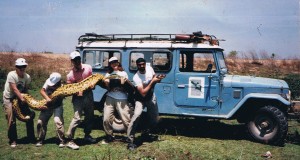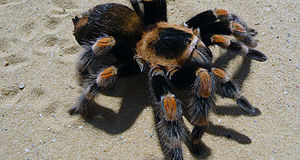A great many people are fearful of snakes and spiders, often to a seemingly unreasonable degree, and without any prior negative experiences. Researchers have long sought to discover if people possess an inborn, instinctual aversion to these creatures, or if learning is involved.
Living Near Venomous Animals
 My own view has always been that it makes sense for people living in the tropics to avoid all snakes and spiders, and I’ve observed that this lesson is taught to children early in life in many places.
My own view has always been that it makes sense for people living in the tropics to avoid all snakes and spiders, and I’ve observed that this lesson is taught to children early in life in many places.
There are still over 10,0000 snakebite deaths yearly worldwide, and in areas of high species diversity it is nearly impossible to distinguish all venomous from harmless species (in recent times, 2 renowned herpetologists were killed by snakes not know to be venomous). On my first research project in Costa Rica, I foolishly believed that I would be able to identify many of the snakes and spiders I might encounter. My first nighttime walk through overgrown scrub quickly taught me otherwise!
Another important point to bear in mind is that animals, especially snakes and spiders, are drawn to homes and gardens due to an unnaturally high density of prey (rodents, insects) and in search of shelter. During the dry season in Venezuela, I collected numerous treefrogs, bats and spiders indoors.
Snakes and Primate Evolution
So, based on my experiences, I leaned toward a learning-based explanation. However, recent work at UC Davis has revealed a possible evolutionary explanation to snake aversion among monkeys and, it is theorized, humans.
Fossil and DNA evidence indicates that large snakes may have been among the first serious predators of modern mammals, and were possibly the driving force behind the development of keen eyesight in Primates. The evolution of the Primate vision system seems linked very closely to fear and vigilance receptors in the brain. As Primates became better at spotting snakes, snakes developed more effective camouflage, and so on.
On Madagascar, where large snakes are absent, Primates (lemurs) have not developed the excellent vision possessed by their relatives on mainland Africa.
Most primates do indeed react with “instinctive” fear upon seeing a snake for the first time. However, I have noticed that a great many creatures, ranging from rodents to elephants, treat novel objects with caution, however harmless they might be.
Research Involving People
Experiments involving people have yielded mixed results. Studies conducted at the Universities of Virginia and Queensland has shown that snakes and spiders draw far more attention from human observers than do other potentially deadly animals or objects.
But many of us have (or, at least, I have!) seen toddlers squeal with delight when presented with a spider or snake…yet they will become quite scared if they see an adult express fear.
One thing I’ve noticed is that snakes and spiders have “odd shapes” (except to herpers!)…I wonder if this draws attention; and anything that moves suddenly can startle an observer, especially if it is new to that person.
Teach Them Early
It seems we must wait awhile for answers that may help people overcome their fears and view our cold-blooded friends more reasonably. Until then, please do your part to introduce the next generation to nature early…the little guy pictured here will have no excuses for disliking herps – I’m starting him out on amphibians, and working my way up the “fear scale”!
Further Reading
You can read more about some of the research mentioned here.
 That Reptile Blog – Reptile, Amphibian and Exotic Pet Care and Information
That Reptile Blog – Reptile, Amphibian and Exotic Pet Care and Information



My parents aren’t really the “scream at spiders” type. They’re outdoorsy, and so am I. But spiders still freak the hell out of me. I mean, I don’t actually freak out if I see one, but I have very strong feelings against touching them. I don’t know where I would have gotten that, if it’s learned. Snakes don’t bother me though. I love snakes. I want to love spiders, too. There aren’t any poisonous ones around here. But it’s just so hard to even bring myself to touch one unless it’s tiny.. and looking at certain ones just makes me want to curl up and shrink away. It’s just so unbelievably repellant. Like nothing else. I guess maybe it is the unusual shape.. the unusual legs, unusual movement.. but there are so many strange creatures, and no insects or other critters bother me like spiders.
Hi Frank great article. My cousin taught me not to be afraid of snakes when I was young however I was born afraid of spiders and haven’t changed my mind since and I am now 67. I just think they have too many legs I also am afraid of scorpions and centipedes, and have no desire to overcome it . snakes I still like. Alison
Thanks for the feedback, Alison, Best, Frank